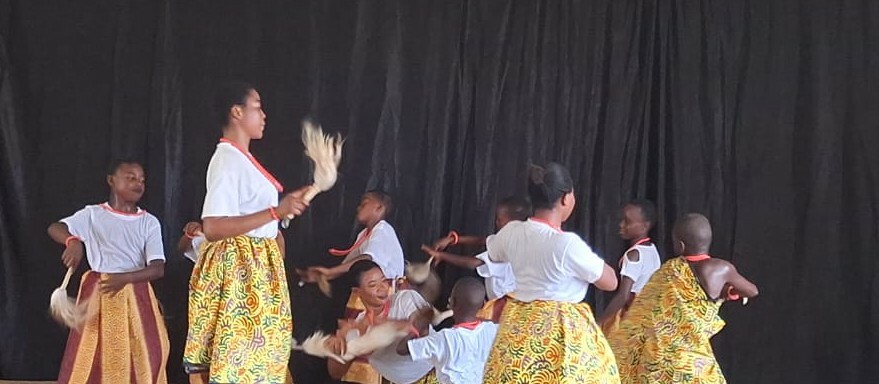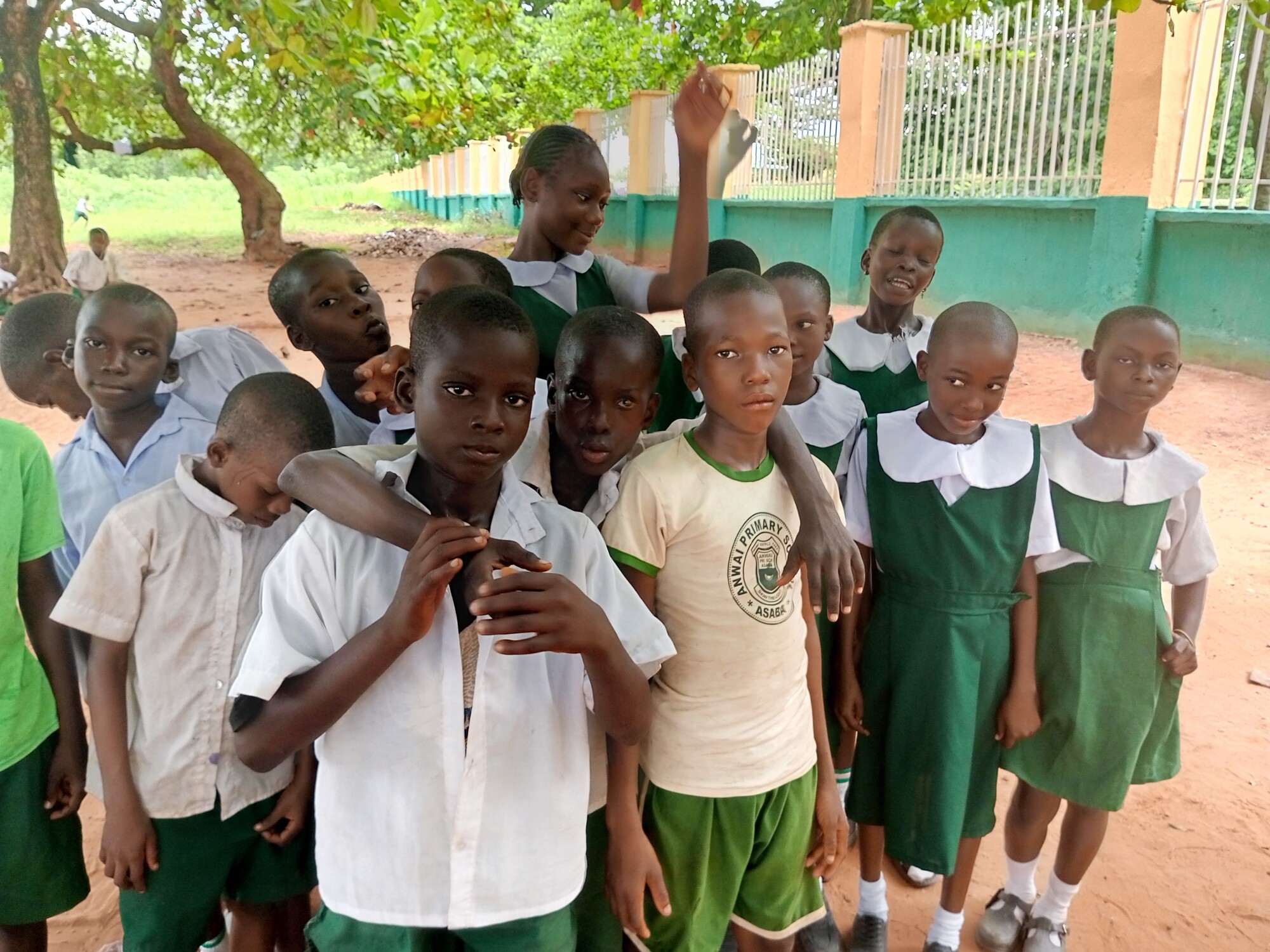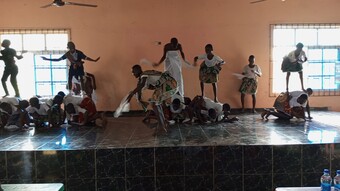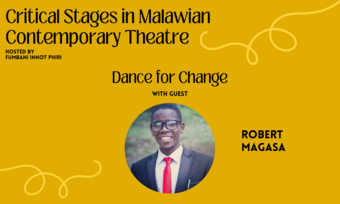Working with the youngsters and teachers of Anwai Primary School was both tasking and interesting as we guided the children in creating a stage performance. The first part of the process was to decipher how to effectively and efficiently communicate this all-important message while still maintaining the entertainment value of in the performance. We settled on creating a play that had trees as some of the characters, although humans played the roles. The trees advocated for their own survival from the encroachment of humans, a choice that highlighted their immense contribution to the ecosystem of the Earth and its preservation.
The performance, titled Tree Talk, is a short dance drama that tells the story of how the trees, which have been at the receiving end of humans’ deforestation drive in the name of industrialization and civilization, decided to revolt against humans in order to save both themselves and the planet. The revolt, however, was quickly squashed by the superior human technology of the bulldozer. This caused a huge flood that wiped out a whole community of humans.
The project was a collaborative creative process that involved both the teachers and students chipping in with their own ideas on the plot of the play and how the performance should be. The students responded impressively to the opportunity to be part of the creative process, contributing great ideas that shaped the overall concept of the performance. Making them part of the creative process helped bring out the latent ingenuity in them and heightened their enthusiasm towards the objectives of the performance.
The creative process for Tree Talk involved an extensive teaching process about climate change for the students who previously had no idea about what climate change is and how it affects them.
Creating and staging the intersection of dance and acting brought to the fore the critical role trees play on our planet. Trees function as indispensable allies in the fight against climate change by regulating the climate, preserving biodiversity, and providing valuable ecosystem services like carbon sequestration, that is, absorbing carbon dioxide, storing carbon in their biomass to help mitigate climate change. Trees also reduce atmospheric carbon dioxide levels, regulate local and global temperatures, moderate extreme weather events, enhance the resilience of ecosystems to climate change impacts, and support carbon cycling and storage in soil. Trees play a critical role in maintaining the health and stability of the planet. Protecting and restoring forests, as well as promoting sustainable land management practices, are essential strategies for mitigating climate change and building a more resilient and sustainable future for all.
The creative process for Tree Talk involved an extensive teaching process about climate change for the students who previously had no idea about what climate change is and how it affects them. Also, they were taught how to use the performing arts to communicate social and environmental issues. The rehearsal sessions were an interesting collaborative process between members of the team of Shanty Theatre, the students, and the teachers of Anwai Primary School. The students were not only talented but were willing learners, which made the process quite easy for us, especially the choreography.
Being in a school setting helped the teaching and rehearsal process. One of the classrooms in the school was turned into our rehearsal room. The teachers, who we had given different topics on climate change to research, took turns teaching the students what they’ve learned. These topics included what climate change is, the causes of climate change, the effect of climate change on the Earth, how it affects us directly and indirectly, and what we should do to turn the tide on climate change and help save our planet.
It was an opportunity to use the medium of the theatre to communicate, educate, and recruit climate activists, who, having understood the imminent danger the world is in through the performance the students put up, would take bold steps to become advocates
After the teaching sessions, which were quite engaging, with the students asking a lot of questions, we dived into the rehearsal proper. Teaching them basic impersonation skills was quite easy, as they were naturals. We, however, added our professional touch to their acting skills, teaching them dance movements, stage movements, interpersonal stage relationships, non-verbal communication skills, and character interpretation. This set the tone for us to rehearse the dance drama performance.
The energy and synergy displayed during the rehearsal was carried into the performance proper, as the students displayed a near flawless understanding of their roles, showcasing their acting and dance skill to communicate the central theme of the dangers of climate change and deforestation to both the environment and people living in it. The stage performance, which took place at the Nuel Ojei Hall, Dennis Osadebey University, Anwai, Asaba, was attended by students of the university and members of different faculties in the university. The performance was both humorous and poignant, eliciting cheers of approval from the audience who enjoyed the performance and embraced the lessons it communicated to them. It was an opportunity to use the medium of the theatre to communicate, educate, and recruit climate activists, who, having understood the imminent danger the world is in through the performance the students put up, would take bold steps to become advocates of environmental friendly policies and investment from both government and private organizations around the world.
The head teacher of Anwai Primary School, Mrs. Somtochukwu Adigwu, was elated to watch her students as they performed. After the performance, she was full of praise about what the students were able to achieve and the worthiness of being part of the very important and urgent drive to raise awareness about climate change and how it affects us as humans. She remarked that the students are now climate champions, and she will do all she can to help them sustain the drive as young environmental activists.
They’ve also found out that their voices cannot be ignored, irrespective of how young they are, when they use theatrical performance to communicate.
The teachers of the school, who were also pleasantly surprised at how adept their students were during the performance, also praised them for putting up such a show that is both educative and entertaining. They commented on their relative lack of knowledge of the effect of climate change and were thrilled to have been educated extensively as part of the performance process that has shown light into the dangers ahead if the right steps are not taken to combat climate change.
The last lap of our collaboration with Anwai Primary School was to establish a dramatic and literary club that would help the students have a platform to hone their skills in theatrical performance and increase their interest in literary art. This club would be headed by the English Language teacher, Ms. Sophia Awele. This dramatic and literary club was important for the children who had realized the immense power of the arts to speak about important issues that affect them, to raise awareness, and to call for the amelioration of these issues. They’ve also found out that their voices cannot be ignored, irrespective of how young they are, when they use theatrical performance to communicate.














Comments
The article is just the start of the conversation—we want to know what you think about this subject, too! HowlRound is a space for knowledge-sharing, and we welcome spirited, thoughtful, and on-topic dialogue. Find our full comments policy here